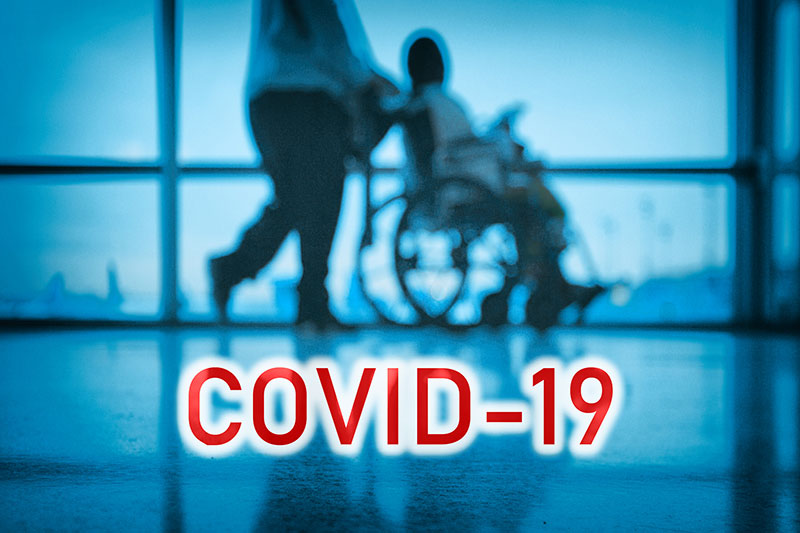Long COVID has emerged as a serious health concern in the United States, with researchers estimating that between 10% and 30% of COVID-19 patients develop long-term symptoms. These symptoms can vary in terms of how/when they appear, and their severity. More chart reviews and studies are vital to understand the impact of long COVID and associated conditions. The United States National Institutes of Health has started an initiative to study long COVID. There are many support groups around the country as well as post-COVID clinics that enable patients to share their experiences. Many patients with long COVID have been unable to return to work full-time or work at all. This has forced them to seek disability benefits to meet their financial needs.
What Is Long COVID?
The CDC (Centers for Disease Control and Prevention) points out that people with long COVID present a range of new or ongoing symptoms that can last weeks or even months after they are infected with the COVID-19 virus. These patients experience physical as well as mental concerns. Some people even experience organ (heart, lungs, kidneys, brain, skin) damage. Here are some of the common symptoms of long COVID:
- Fatigue
- Difficulty breathing/shortness of breath
- Brain fog or difficulty concentrating or thinking
- Dizziness on standing
- Headache
- Cough
- Chest pain, joint pain, muscle pain
- Heart palpitations
- Fever
- Depression or anxiety
- Loss of taste or smell
According to hhs.gov guidance on long COVID as a disability, long COVID can be a disability under the ADA, Section 504 and Section 1557 if it substantially limits one or more major life activities. Long COVID is considered a physical impairment or condition affecting one or more body systems because some people with long COVID experience organ damage, neurological damage, and damage to the circulatory system causing poor blood flow. It is considered to be a mental impairment because some patients experience lingering emotional illness and other mental health conditions.
Another reason why long COVID is considered a disability is because it can substantially limit one or more major life activities, as the hhs.gov guidance highlights. Major life activities include caring for oneself, doing manual tasks, eating, sleeping, hearing, seeing, walking, standing, sitting, lifting, bending, breathing, learning, concentrating, thinking, writing, communicating, interacting with others, speaking and working. Major life activities would also include the operation of a major physical function such as those of the cardiovascular system, immune system, neurological system, circulatory system, or the operation of an organ.
Situations in which a long COVID patient may be substantially limited in a major life activity could be:
- A patient with lung damage that causes fatigue, breathing difficulty, and related effects is substantially limited in respiratory function, among other major life activities.
- A patient with symptoms of intestinal pain, nausea, and vomiting that have been ongoing for months is substantially limited in gastrointestinal function among other major life activities.
- A patient who experiences memory lapses and brain fog is substantially limited in brain function, thinking and/or concentrating.
However, it is to be noted that long COVID is not always considered to be a disability. The HHS says that an individualized evaluation is necessary to determine whether a person’s long COVID condition or any of its symptoms substantially limits a major life activity.
ADA Rights for Long COVID Patients
Regarding the rights of patients whose long COVID qualifies as a disability under the ADA Section 504 and Section 1557, they are entitled to the same protections from discrimination as any other person with a disability under the ADA Section 504 and Section 1557. This signifies that businesses/state or local governments may sometimes need to make changes to the way that they operate to accommodate a person’s long COVID-related limitations. These changes could include the following:
- Provide additional time on a test for a student who has difficulty concentrating
- Provide refueling assistance at a gas station for customers whose joint/muscle pain prevents them from pumping their own gas
- Modify procedures so that customers who find it too tiring to stand in line can announce their presence and sit down without losing their place in line
- Modify a policy to allow a person who experience dizziness when standing to be accompanied by his/her service animal that is trained to stabilize them
Social Security Disability Benefits for Long COVID Patients
What about social security disability benefits for people with long COVID symptoms? The Social Security Administration (SSA) defines a disability as an illness or injury that prevents substantial gainful employment and has lasted or is expected to last for at least 12 months, or result in death. Some patients with long COVID symptoms may meet this definition.
Speaking of long COVID patients, some disability rights advocates say that COVID-19 could be the largest disabling event since polio (news.wttw.com). Doug Nguyen, the regional communications director for the (SSA)’s Chicago region, points out that a person who has limitations resulting from COVID infection, which have met or are expected to meet the SSA’s duration requirement, could be found disabled if his/her limitations equal a medical listing or if the combination of those limitations and vocational factors prevent them from working.
Long COVID patients may be able to match the SSA’s Blue Book listings for respiratory illnesses, heart conditions, and other disabilities. Or, to determine how their long-term COVID symptoms affect their ability to perform tasks associated with work and daily self-care, they could undergo an RFC or residual functional capacity evaluation. If the impact of their symptoms is considered disabling, they could be approved for social security benefits.
The SSA has released an emergency message providing some guidance on handling applications that allege post-COVID conditions. However, this message is not a ruling or medical “listing”. Neither does it discuss in detail how the SSA will determine whether someone unable to work because of post-COVID symptoms is eligible for benefits. According to the message,
- The SSA must be able to establish the disabling impairment as a “medically determinable impairment” or MDI
- The impairment must be established by lab findings and medical signs rather than a patient’s subjective complaints alone
- To find that the impairment is medically determinable, the SSA needs to see one of the following:
- A positive viral test for SARS-CoV-2 (not an antibody test)
- A diagnosis of COVID with signs such as fever and cough, consistent with COVID
- A diagnostic test consistent with COVID, such as a chest X-ray
If the evidence indicated a false positive viral test, the SSA will not consider it.
- The long COVID syndrome must prevent the claimant from working for 12 months. In considering the duration, the SSA will consider more than just long COVID symptoms. If the COVID infection causes a new MDI such as kidney disease or worsens an existing MDI such as COPD, that would help meet the 12-month requirement. The SSA could postpone the decision on a claim for several months if it is not clear whether or when the long COVID symptoms would resolve.
Once the SSA is convinced that the claimant is unable to do a significant amount of work and has an MDI, they will determine whether the claimant’s condition is so severe that it is of “listing level” severity. Currently, there is no listing for post-COVID syndrome. However, the agency may find that the claimant’s symptoms make him/her just as disabled as someone who meets a listing.
- They will compare the claimant’s limitations and symptoms to the criteria of any applicable medical listings to determine if the claimant’s symptoms are as severe as those on the listings.
- In case the claimant doesn’t meet or equal a listing, the SSA will next consider whether he/she has any functional limitations that were caused by COVID, or by a disability that was worsened by COVID. For this, the SSA would consider the claimant’s symptoms as well as his or her endurance/stamina when evaluating whether he/she can perform sustained work activity.
- If the claimant cannot perform sustained work activity, the SSA will evaluate the claimant’s RFC (residual functional capacity) and may grant the disability benefits.
Supporting Medical Evidence Is Most Important
As a medical records services company assisting disability attorneys, we understand that getting disability benefits for long COVID could be quite challenging. Perhaps, patients with existing severe disabilities or impairments that were worsened by COVID infection may have a better chance of getting disability benefits. Through a comprehensive chart review, the disability attorney can understand how and why a claimant’s condition equals a particular listing, or how and why their RFC has been considerably reduced by long COVID symptoms. Just as in any other disability claim, medical evidence that can support the disabling condition is the most important requirement. So, attorneys may advise their clients to obtain clear documentation of their symptoms and limitations from their doctors or specialists.




